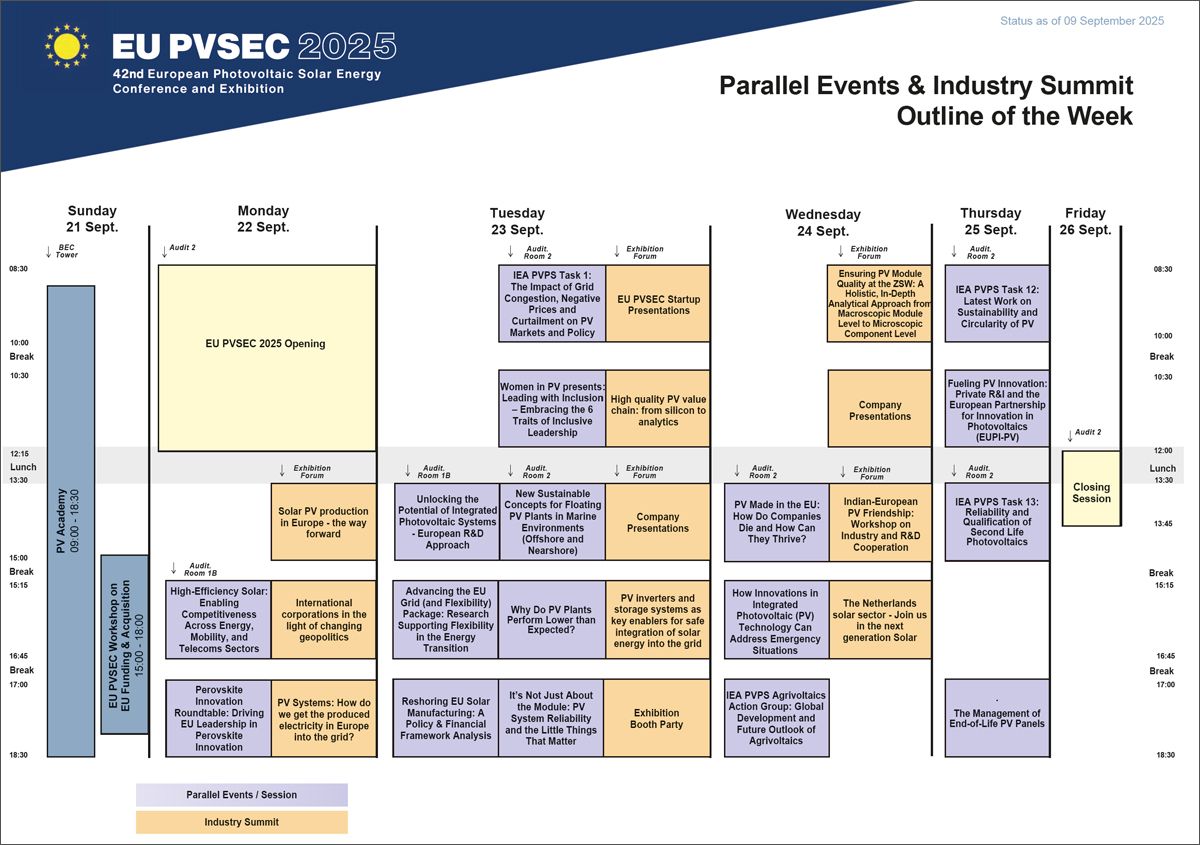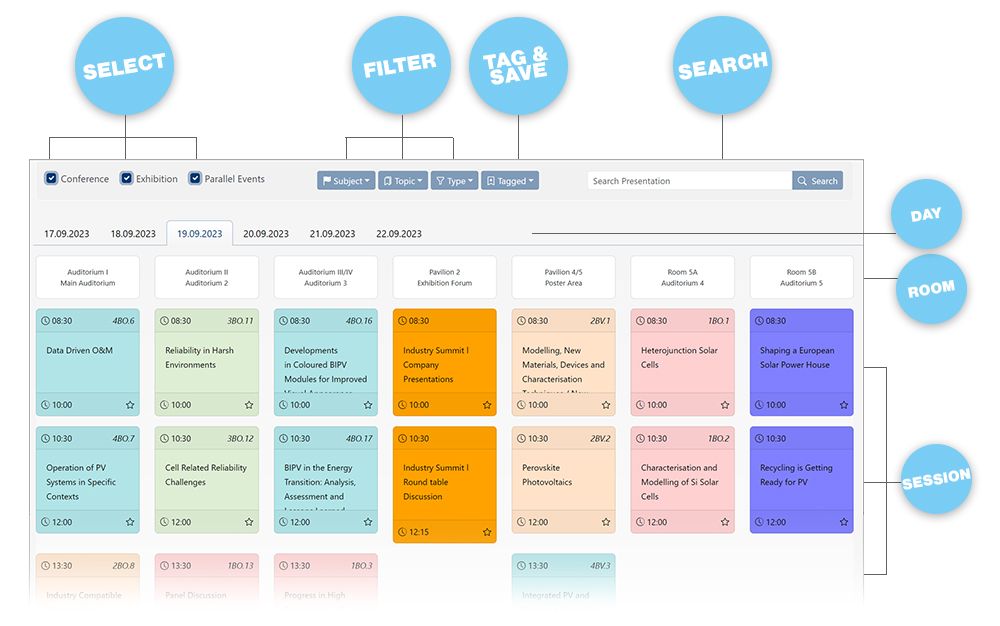PARALLEL EVENTS PROGRAMME
The EU PVSEC 2025 Parallel Events offer a deep insight into specific topics along the most recent PV technology, PV application and market trends and address to global decision makers from industry, research, finance and politics. The Parallel Events are open to all registered conference participants.
Overview on Parallel Events 2025
Are you curious about what else is happening at the 42nd EU PVSEC besides the numerous scientific conference sessions? Check out the short Parallel Events descriptions below. For the further information regarding the presentations and speaker, please visit the interactive programme planner here.
15:00–18:00
EU Projects Proposal Writing:From Vision to Success

The workshop will cover a range of topics essential for successful proposal writing under Horizon Europe and LIFE programmes, as well as other funding instruments. Participants will learn about the structure and requirements of EU proposals, best practices for writing, and strategies for effectively presenting their project ideas. The content is tailored to both beginners and those with some experience in proposal writing.
Read more ▼
The course will cover:
- Overview of EU funding opportunities
- Key components of a successful proposal
- Writing clear and concise objectives
- Developing a robust methodology
- Demonstrating project impact
- Budget planning and justification
- Common pitfalls and how to avoid them
- Practical exercises and feedback session
- Ask-Me-Anything session with EU funding Senior Expert and European Commission’s evaluator
15:15–16:45
High-Efficiency Solar: Enabling Competitiveness Across Energy, Mobility, and Telecoms Sectors Oxford PV

17:00–18:30
Perovskite Innovation Roundtable: Driving EU Leadership in Perovskite Innovation

The Perovskite network of EU-funded research projects (PEARL, DIAMOND, VALHALLA, SuPerTandem, NEXUS, TRIUMPH, PERSEUS, LUMINOSITY, LAPERITIVO and Smartline PV) focused on perovskite solar technology are coming together to share insights, lessons learned, and discuss emerging trends shaping the field. This collaborative exchange will highlight key scientific and technological results in ongoing projects and how they can help address the challenges and opportunities in scaling up perovskite photovoltaics to large area modules and manufacturing.
Read more ▼
In three parts (fully printed; flexible vs rigid substrates; tandems), a range of cross-cutting challenges and promising avenues of research will be raised, as well as common exploitation opportunities and policy recommendations.
- PERSEUS, DIAMOND and PEARL projects will be discussing printed carbon vs evaporated metals; environmental footprint (LCA) vs. Efficiency.
- LUMINOSITY, VALHALLA, Smartline PV and SuPerTandem projects will be discussing flexible vs. rigid substrates: manufacturability and upscaling balance.
- LAPERITIVO, TRIUMPH and NEXUS projects will be discussing tandem architectures (single junction vs 2T, 4T, vs triple-junction+ tandem) and the race to push efficiency to the limits.
8:30–10:00
IEA PVPS Task 1: The Impact of Grid Congestion, Negative Prices and Curtailment on PV Markets and Policy

10:30–12:00
Women in PV presents: Leading with Inclusion – Embracing the 6 Traits of Inclusive Leadership

This interactive workshop offers a dynamic, participative experience and is designed to help professionals internalise and apply the six traits of inclusive leadership, as defined by Deloitte: Commitment, Courage, Cognizance of Bias, Curiosity, Cultural Intelligence, and Collaboration. Inclusive leadership is not just about good intentions – it’s about consistently making choices and building habits that foster equity, respect, and belonging in diverse teams.
Read more ▼
Participants will be assigned to tables, each focusing on one trait, where they’ll engage in scenario-based discussions, group reflection, and problem-solving activities. The goal is to deepen understanding, challenge assumptions, and identify personal and organisational practices to enhance inclusivity.
Each table will have one table lead who will be provided with a guide to facilitate the discussion and help underpin the outcomes to be shared during the short conclusions’ panel discussion afterwards.
13:30–15:00
Unlocking the Potential of Integrated Photovoltaic Systems - European R&D Approach

13:30–15:00
New Sustainable Concepts for Floating Photovoltaic Plants in Marine Environments (Offshore and Nearshore)

15:15–16:45
Advancing the EU Grid (and Flexibility) Package: Research Supporting Flexibility in the Energy Transition

15:15–16:45
Why Do PV Plants Perform Lower than Expected?

PV plant managers and operators grapple with a range of challenges, including subpar energy production, ineffective solar tracker algorithms, undetected performance losses, overwhelming data and alarms, while declining electricity prices are putting downward pressure on O&M costs.
The EU Project PVOP is developing a series of solutions to address these problems. In this event, a detailed explanation of two aspects of interest will be given in a participatory way:
- estimating losses by backtracking algorithms in undulating terrain
- analysis of the loss chain and identification of deviations from initial expectations.
17:00–18:30
Reshoring EU Solar Manufacturing: A Policy & Financial Framework Analysis

17:00–18:30
It’s Not Just About the Module: PV System Reliability and the Little Things That Matter - PV CAMPER

Most photovoltaic (PV) reliability research is focused on module performance, which is a critical—but not sole—determinant of lifetime energy generated from PV systems. Increasingly, however, balance-of-system (BoS) components, as well as module materials, are emerging as significant contributors to PV system reliability. Essential electrical components, e.g., PV connectors, junction boxes and cables, are exhibiting high failure rates in the field, sometimes within months of installation, and polymers everywhere in the PV system are degrading faster than expected. Supply-chain quality is one factor, as is installation quality, but climatic stressors, and also the operating environment in which the PV plant is located, play a role.
Read more ▼
This session brings together members of the PV Collaborative to Advance Multi-climate Performance & Energy Research (PV CAMPER), to address BoS reliability from a global perspective, with panelists presenting findings from field and lab-based investigations conducted across different climates and geographies. This session will 1) include case studies and forensics data from under-performing PV plants; 2) introduce best practices for investigating and mitigating component failures; and 3) foster, with the help of audience engagement, an international dialogue on the topic of BoS reliability.
13:30–15:00
PV Made in the EU: How Do Companies Die and How Can They Thrive?

The IBC4EU workshop titled "Made in EU PV: How do companies die, and how can they thrive" will highlight the role of Interdigitated Back Contact (IBC) technologies in shaping the future of PV manufacturing in Europe. The session will open with a market and ecosystem overview, followed by concise presentations from industry partners and an engaging panel discussion. The goal of the session is to deliver directly actionable recommendations for policy makers at both European and national levels, helping accelerate the development of local PV manufacturing and ensuring it is sustainable".
15:15–16:45
How Innovations in Integrated Photovoltaic (PV) Technology Can Address Emergency Situations

In times of crisis – whether hurricanes, pandemics, wars, floods, or other disasters – access to reliable electricity becomes a critical necessity. Solar power has emerged as a simple, efficient, and rapid-deployment energy solution that can support essential infrastructure and humanitarian efforts in emergency situations.
Read more ▼
It powers emergency shelters, hospitals, and medical equipment, ensuring continuous operation. It also sustains communication networks, enabling real-time coordination for relief efforts. Beyond electricity, solar energy supports clean water access and food security by powering purification systems and refrigeration for supplies.
Innovations in Integrated Photovoltaic (PV) technology are making solar energy more adaptable to a wide range of crisis scenarios. These advancements will be presented and discussed, showcasing how solar power can be further optimized for emergency applications.
17:00–18:30
IEA PVPS Agrivoltaics Action Group: Global Development and Future Outlook of Agrivoltaics

The Agrivoltaics Action Group at the IEA PVPS is an international team of about 100 experts, working on emerging topics of agrivoltaics, focusing on a collaborative effort to explore the synergies between agriculture and solar energy generation. Through international cooperation and interdisciplinary engagement, the group aims to enhance the potential of agrivoltaics by optimizing land use, improving agricultural resilience to climate change, and encouraging broad-based support for solar energy initiatives. During the parallel event the main outcomes of the activities carried out so far will be presented.
08:30–10:00
IEA PVPS Task 12: Latest Work on Sustainability and Circularity of PV

IEA PVPS Task 12's goal is to foster international cooperation and knowledge sharing on the sustainable aspects of PV technology, emphasizing environmental and social factors. Its mission is to provide essential information to stakeholders, thereby enhancing consumer and policy-maker confidence in PV systems, and accelerating the shift towards sustainable energy. Our international expert group is diligently working on several key topics to enable the deployment and operation of PV energy at multi-terawatt levels, such as circular economy, life cycle assessment, ecosystem-integrated PV systems, and social acceptance topics.
Read more ▼
10:30–12:00
Fueling PV Innovation: Private R&I and the European Partnership for Innovation in Photovoltaics (EUPI-PV)

The European Partnership for Innovation in Photovoltaics (EUPI-PV) is a key initiative aligning European PV Research & Innovation (R&I) with strategic policy objectives. Officially established with the recent signing of the Memorandum of Understanding, this partnership between the European Commission and the PV scientific community plays a central role in ensuring that research priorities shape Horizon Europe calls, reinforcing Europe’s leadership in photovoltaics. By defining and promoting the Strategic Research and Innovation Agenda (SRIA), it provides a structured framework to advance PV technologies and drive impactful innovation.
13:30–15:00
IEA PVPS Task 13: Reliability and Qualification of Second Life Photovoltaics

Join us for an insightful session on the 2nd life of PV modules, where we will examine current approaches to repair, testing, and quality control in repurposing photovoltaic technology. The discussion will begin with a review of existing repair methods, assessing their efficiency and long-term stability. It will then explore best practices and technical challenges related to reliability testing, sorting, and quality/safety control, while also evaluating the cost implications of these processes. This session offers a valuable opportunity for industry professionals, researchers, and policymakers to engage with experts and contribute to the future of sustainable PV module reuse.
Read more ▼
The objectives of this PVPS Task 13 Workshop are:
- Provide a review of technical efforts aimed at repair and refurbishment but also enhanced reparability of PV modules to enable a 2nd life.
- Exchange information about re-qualification and bankability of 2nd life PV and summarize field experience of 2nd life PV
- Presentation of various business models for establishing reuse of photovoltaic modules.
17:00–18:30
The Management of End-of-Life PV Panels

This workshop will delve into the critical challenges and groundbreaking solutions in managing end-of-life (EoL) photovoltaic (PV) panels. As the PV industry continues to expand, addressing the environmental and economic implications of panel disposal has become a priority.
Industry experts will present the latest advancements in PV recycling technologies, refurbishment strategies, and silicon purification processes. Special attention will be given to innovative approaches aimed at maximizing material recovery, also considering Critical Raw Materials, improving cost-effectiveness, and reducing the carbon footprint of PV waste management.



